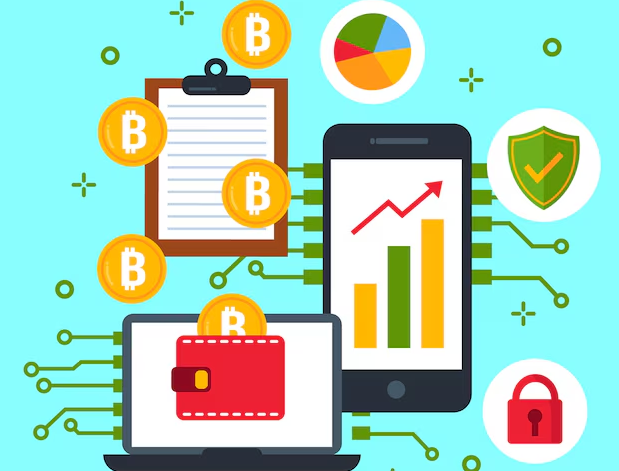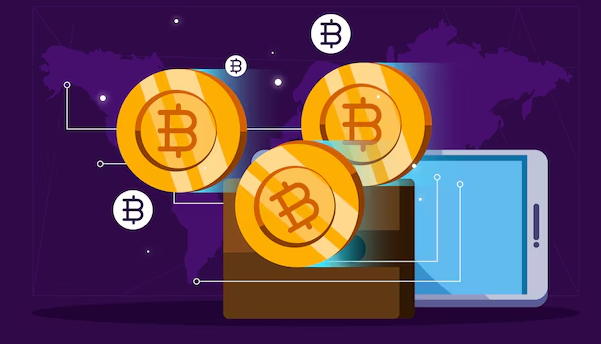In the dynamic world of digital finance, Bitcoin has stood out as a premier choice for both new and seasoned investors. As the cornerstone of cryptocurrency transactions, the Bitcoin wallet is an essential tool for anyone looking to engage with this digital currency. Whether you’re planning to buy, sell, or simply hold Bitcoin, understanding the different types of Bitcoin wallets and how they operate is fundamental. This comprehensive guide delves deep into the mechanisms of best Bitcoin wallets, from the basics of private keys to the security measures you should consider, helping you navigate through the choices to find the best wallet that suits your needs. We’ll explore the distinctions between custodial and non-custodial wallets, unravel the features of HD wallets, and review the new Bitcoin wallet solutions available today, ensuring you’re well-equipped to manage your digital assets effectively.
What is a Bitcoin Wallet?
Navigating the world of cryptocurrencies can be as thrilling as it is daunting, particularly when it comes to managing your digital assets. Central to this experience is the Bitcoin wallet—a vital tool for anyone looking to use Bitcoin, whether you’re buying your first satoshi or managing a significant portfolio. Understanding what a Bitcoin wallet is and how it operates not only empowers you with the control needed to secure your digital wealth but also enhances your ability to make informed decisions in the cryptocurrency ecosystem.
A Bitcoin wallet does more than just store your digital currency, it interacts with the Bitcoin blockchain to enable transactions, providing a balance of accessibility and security. This piece of technology ranges from hardware gadgets that fit in your pocket to apps on your mobile device, each designed to address different needs and risks. As we delve deeper into the mechanics of best Bitcoin wallets, you’ll gain insights into the fundamental roles they play, from the safeguarding of your private keys to the facilitation of seamless financial transactions across the globe.
Understanding private keys
A Bitcoin wallet fundamentally functions as a digital interface, allowing you to interact with the Bitcoin blockchain. At the core of this interaction are private keys. These keys are essentially long, complex passwords that prove ownership of the Bitcoins stored in your wallet. Understanding how to secure your private keys is paramount, as anyone who gains access to them can control your funds.
Custodial vs. Non-Custodial Wallets
When choosing a new Bitcoin wallet, you’ll encounter the terms “custodial” and “non-custodial.” Custodial wallets are managed by a third party, like an exchange, which means they keep your private keys. This might be convenient for beginners, but it also means you don’t have full control over your funds. Non-custodial wallets, on the other hand, give you full control as they require you to manage your private keys.
HD Wallets Explained
Hierarchical Deterministic (HD) wallets are a sophisticated type of Bitcoin wallet that generate a hierarchical structure of keys from a single starting point called a seed. This feature simplifies wallet backup and restoration and enhances security and privacy by generating a new address for every transaction.
Different types of Bitcoin Wallets
Exploring the types of Bitcoin wallets is crucial for making an informed choice. There are several kinds including hardware, desktop, mobile, and web wallets. Each type offers different levels of security and convenience, depending on your needs.

Which Bitcoin Wallet is best for you?
When it comes to selecting a Bitcoin wallet, the diversity of options can be both a blessing and a challenge. Each type of wallet offers distinct advantages and potential drawbacks, tailored to different usage patterns and security preferences. Whether you’re a newcomer to the cryptocurrency world or an experienced user looking to optimize your setup, understanding the fundamental aspects of each wallet type is crucial. This will not only enhance your operational security but also ensure that your digital assets are accessible and functional according to your daily needs.
Moreover, the choice of a Bitcoin wallet deeply influences how you interact with the broader cryptocurrency ecosystem. From simple transactions, such as sending and receiving Bitcoins, to more complex operations like participating in smart contracts or securing large amounts of assets for long-term storage, the functionality of your wallet plays a pivotal role. As such, aligning your wallet choice with your personal and financial priorities—security, convenience, privacy, or control—is essential for a satisfying and effective Bitcoin management experience.
Top Bitcoin Wallets
In the evolving landscape of cryptocurrency, choosing the right Bitcoin wallet is a critical decision that affects both the security of your assets and the ease of your transactions. A Bitcoin wallet isn’t just a tool for storing digital currency, it serves as your personal interface to the Bitcoin network, facilitating the management, sending, and receiving of funds. The diversity of wallets available today means that there’s a solution tailored to fit every need, from the security-conscious investor to the everyday user looking for convenience.
As we dive into the best Bitcoin wallets, it’s important to consider what each type offers and how it aligns with your individual security requirements, device preferences, and financial habits. Whether you opt for the robust security of a hardware wallet or the accessibility of a mobile wallet, understanding the strengths and limitations of each category will help you make an informed choice. This section aims guide to Bitcoin wallets you through the best Bitcoin wallets available, helping you find a reliable and user-friendly option that meets your crypto needs.
Top Hardware Wallets
Hardware wallets are considered the most secure type of the best Bitcoin wallet for mobile. They store your private keys on a physical device that remains offline, protecting your funds from online threats. Brands like Ledger and Trezor are highly recommended for anyone serious about security.
Best desktop Wallet options
Desktop wallets are software programs that store your Bitcoin wallets on your computer. They offer a good balance between security and convenience, especially for users who prefer having full control over their wallets without relying on third-party services.
Leading mobile Wallets
For those always on the go, mobile wallets are the best option. These apps allow you to manage your Bitcoins from your smartphone, making it easy to pay for goods and services, transfer funds, and check your balance at any time.

Additional terms related to Bitcoin Wallets
In the ever-evolving landscape of cryptocurrency, understanding the nuanced terminology associated with standard Bitcoin wallet can greatly enhance your ability to navigate this digital finance world effectively. As the backbone of cryptocurrency transactions, wallets encompass various forms and functions, each tailored to different user needs and security requirements. Delving into these additional terms not only clarifies how transactions are processed but also highlights the diversity of wallet structures and the security measures they offer.
For both new and seasoned users, grasping these concepts is crucial for making informed decisions about managing digital assets. From multisignature setups that bolster transaction security to simplified payment verification methods that enhance usability on mobile devices, the terminology surrounding new Bitcoin wallet is both expansive and essential. Understanding these terms empowers users to choose the right tools for their needs, ensuring both the safety of their assets and the efficiency of their transactions.
Multisignature (Multisig) Wallets
Multisig wallets require more than one key to authorize a Bitcoin transaction, greatly enhancing security. They are ideal for business accounts or any situation where funds need to be jointly managed.
SPV Wallets overview
Simplified Payment Verification (SPV) wallets do not download the entire blockchain but instead rely on network nodes to verify transactions. This makes SPV wallets faster and less resource-intensive, suitable for mobile devices.
Brain Wallets: what you should know
Brain wallets are Bitcoin wallets generated from a passphrase that you memorize. While they can be secure if the passphrase is complex enough, they are vulnerable to brute-force attacks if not.
How to manage your Bitcoin Wallet
Effective management of your Bitcoin wallet is crucial to safeguarding your digital assets. It is essential to ensure that your wallet software is always updated to the latest version. These updates are not just routine, they often contain vital security patches and new functionalities that can protect your assets from new threats. Alongside software updates, setting strong, unique passwords for your wallet access and its encryption is critical. This dual layer of security helps shield your wallet from unauthorized access and potential breaches.
In the dynamic realm of cryptocurrency, staying ahead of security threats is imperative. Be proactive about your cybersecurity by being aware of common risks like phishing schemes and malware attacks. These threats are particularly prevalent in the cryptocurrency domain, making it necessary to be diligent. Regularly auditing and upgrading your security practices will not only help in minimizing vulnerabilities but also in fortifying your wallet against possible intrusions. This proactive Bitcoin wallet app is key to maintaining the integrity and security of your Bitcoin wallet.

How to backup your Bitcoin Wallet
Backing up your Bitcoin wallet is a critical step in maintaining access to your funds under any circumstances, such as device failure, theft, or accidental data loss. Most Bitcoin wallet programs utilize a recovery mechanism known as a seed phrase. This seed phrase, typically a string of 12 to 24 words, is generated by your wallet and provides the only means of recovering your wallet’s data on a new device. It is imperative to record this seed phrase accurately and store it in a highly secure environment.
To enhance the security of your backup, it’s advisable to keep the seed phrase in multiple secure locations. This diversification ensures that if one copy is compromised or destroyed, you can still access your funds through another. Safe options include bank safety deposit boxes, fireproof safes, or any secure facility that offers restricted access. Managing these backups with meticulous care is essential to ensure that you can always recover your Bitcoin wallet, thereby safeguarding your digital investments.
Managing transaction fees
Transaction fees in the Bitcoin ecosystem play a pivotal role, serving as the incentive for miners to process and validate transactions by including them in the blockchain. These fees fluctuate based on the current level of network activity—higher fees can expedite transaction confirmation during times of high congestion. By mastering the ability to tailor transaction fees to the prevailing network conditions, you can optimize your spending and prevent unnecessary overpayments. Most Bitcoin wallet programs incorporate features that assist users in estimating the necessary fees or even setting them manually, providing significant control over transaction costs.
In-depth understanding and strategic management of these fees are essential for efficient financial operations within the Bitcoin network. Tools provided by various Bitcoin wallet app enable users to navigate this aspect thoughtfully, allowing for adjustments based on real-time network performance. Such capabilities ensure that users can balance between cost efficiency and transaction speed, enhancing their overall experience with Bitcoin transactions.
Key points to be aware of
Maintaining up-to-date knowledge of security measures is critical for safeguarding your investments in cryptocurrency. This encompasses not only implementing advanced technological defenses but also keeping an eye on regulatory developments that might influence your cryptocurrency dealings. As regulations surrounding digital currencies continue to transform, staying informed about these changes is crucial not only for legal compliance but also for adapting your investment strategies to align with current laws.
The dynamic nature of cryptocurrency regulation demands vigilant awareness and understanding from all participants in the space. By staying informed about both security enhancements and regulatory shifts, you can better protect your assets and navigate the complex landscape of cryptocurrency with greater confidence and legality. Adapting to these changes can significantly impact how you manage and maximize your cryptocurrency investments.
Final thoughts – top recommendations
Selecting the appropriate Bitcoin wallet is a pivotal step for anyone engaging in cryptocurrency dealings. The process of choosing should be rooted in a comprehensive awareness of the diverse wallet types at your disposal, each distinguished by unique security attributes and user interfaces. Reflect on your typical transaction behaviors, the level of security you aspire to, and the devices from which you will manage your wallet. Customizing your selection to align with your specific lifestyle and financial goals can significantly optimize your interactions with cryptocurrencies, bolstering both security and operational fluidity.
Such a deliberate selection process is instrumental in simplifying the intricacies associated with digital currencies, enabling you to engage with them more effectively and with increased assurance. By integrating a strategic evaluation of your needs with a deep understanding of wallet technologies, you position yourself to navigate the digital currency ecosystem with enhanced proficiency and peace of mind. This informed approach ensures that your cryptocurrency journey is not only secure but also aligned with your personal and financial aspirations.






